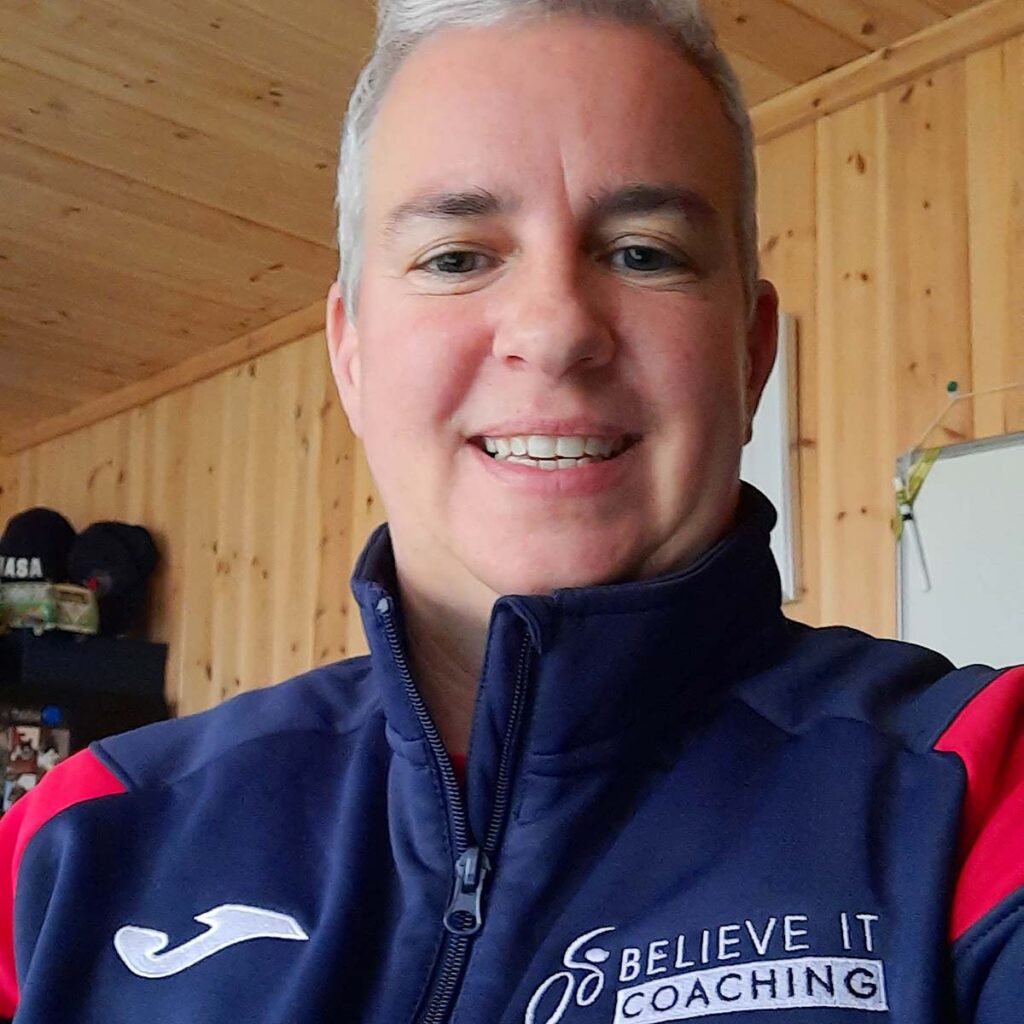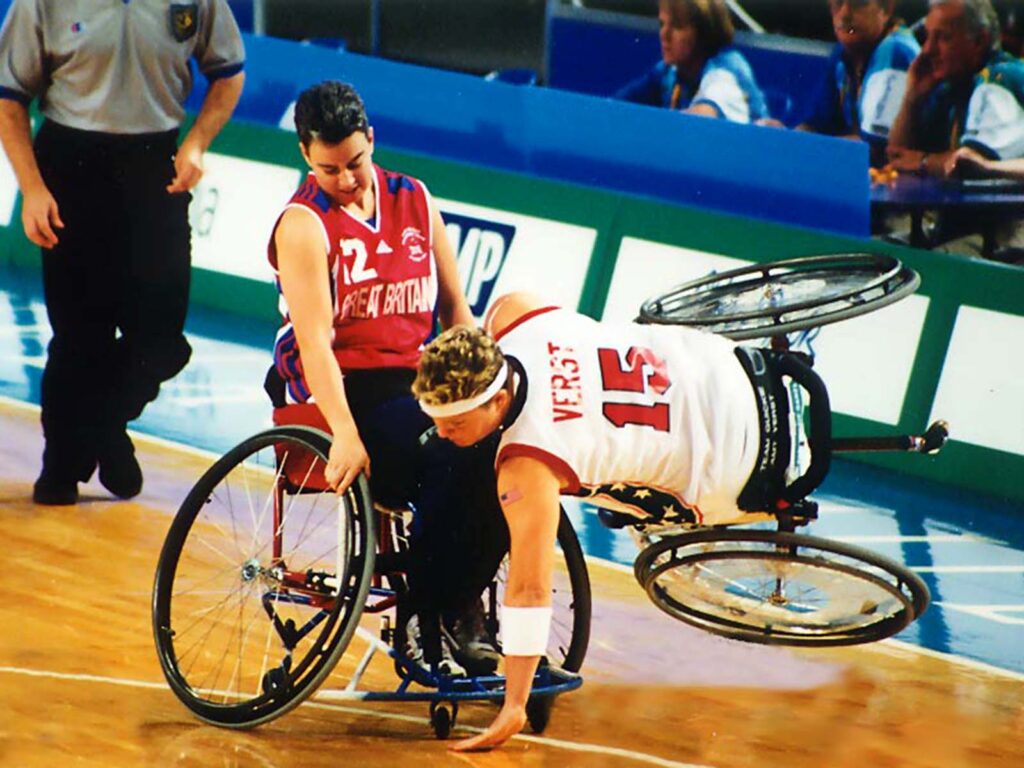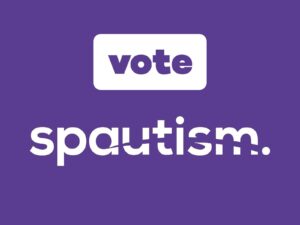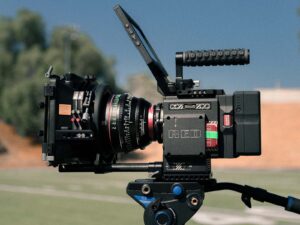Anna Jackson: The making of me

After retiring from their career as a wheelchair basketball player, Anna Jackson spent time in a number of different jobs before starting their own business in 2017 called Believe it Coaching.
They then decided to have a wooden cabin built in their back garden which has become a home gym and a calming space, as well as an office that allows them to work from home.
Their desk is positioned below a display of several Team GB caps that they have collected from representing Great Britain at international tournaments. On the other side of the room there is a stack of wheelchair wheels that need new tyres – an addition that Anna explained is typical in the home of any athlete in their sport.
Hanging proudly above the wheels are two jerseys: a bright red vest from Anna’s first Team GB appearance at a World Championships in 1998, next to a white vest which they wore at the Sydney 2000 Paralympics.
On shelves around the room, there are plenty of small but poignant mementos from trophies and medals to a basketball graffitied with signatures their former team-mates in the British Wheelchair Basketball (BWB) Women’s League.
“When I’m not feeling at my best or I’m struggling with my mental health, those things remind me of what I’ve done and to be proud of my achievements,” said Anna. “There’s a fine line between that and showing off, but they are about memories, and it can be easy to lose those things in the middle of everything else.
“My background comes from being a hockey and tennis player, and a hockey coach, but I had problems with my legs in my teenage years and had to give up all my sport. I ended up having nine lots of surgery and countless hours of physio.
“I discovered wheelchair basketball 24 years ago, purely by chance, and went and had my first go at it. I joined the British squad within six months, which was a bit of a surprise, and I then went on to have a 10-year career.
“Then I just bumbled along after that trying to work out what life was all about. I bounced between different jobs and never quite settled, but I’m now 18 months post-autism diagnosis and six months post-ADHD diagnosis so the last couple of years for me have explained so many things.
“It’s been really interesting to realise why sport was such a driver for me and a great thing to be involved with, but also how now running my own business as a wheelchair basketball coach and tutor, and working in counselling and mental health, make sense from a diagnosis point of view.
“I struggle to stick to one thing, so I fill my weeks with lots of things – within which are massive commitments and me wanting to do really well.”

As well as running Believe It Coaching and studying for a master’s degree in Clinical Counselling, Anna works as a mental health crisis worker and is the head coach at a local wheelchair basketball club – Cheshire Phoenix.
At one Phoenix training session they started chatting with the parent of a child who was taking part and on the autism spectrum, and it was also then when Anna explained that all four of the coaches delivering the session were autistic too and each one had just completed their first coaching award.
“They are in an environment where they are learning and growing and delivering things to other kids and people – that’s absolutely magic.
“Phoenix is a development level club and we focus on helping players not just build basketball skills but develop an identity and a sense of confidence, helping them grow with those differences and learn about themselves. It’s very person-centred – everybody is different in that club.
“Wheelchair basketball is such an accepting space and it gave me a sense of holding my head up high and being proud.
“Sport was the place where I could just be me – I knew what kit to wear, what time I had to be there, the rules of the game. There were lots of controllables that I understood, whereas growing up social situations were difficult, I didn’t know where I was going to sit, who was going to be drinking if I was in the pub etc.; it was just too much, so I stayed away from those things.
“When other things chipped away at my identity, sport gave me what life wasn’t giving me: self-confidence and self-belief. I often say in talks that sport and wheelchair basketball made my life, but I am absolutely convinced that it saved my life.
“It’s massive, and it’s given me… me!”
Wheelchair basketball has made significant progress in recent months as BWB gets set to begin the inaugural Women’s Premier League in January 2022.
It will be the UK’s first professional parasport league and the top tier for women’s wheelchair basketball in this country, with four teams – Cardiff Met Archers, East London Phoenix, Loughborough Lightning, and Worcester Wolves – playing each other three times until the conclusion of the league in late spring.
“We have these great players in the UK and they were playing with Women’s League teams, but we didn’t have this top level before to really show off the sport.
“These players are now being put on a pedestal and watching teams announcing their players on social media is amazing.
“We can learn more about these individual players and help more people see how amazing our sport is. It’s really exciting to have the top league now to look at and follow these players; you can see the buzz around the teams on social media.
“The GB players are used to being together as a team but now they are mixed with other players from across the country and you can see them growing as leaders both on and off the court.
“Wheelchair basketball is now part of something much bigger, not just on the periphery of the sport but in the centre of it all, and people can go and watch those teams play.
“I am too old now, but I would have loved to have rolled out as part of one of those teams.”
In the Worcester Wolves team is World Championship silver medallist Sarah Hope, who we spoke to in the summer of 2020 about her relationship with sport.
“I often say in talks that sport and wheelchair basketball made my life, but I am absolutely convinced that it saved my life.”
Anna Jackson
Since Anna’s diagnosis, they too have been able to understand why they react to different sensory stimuli in certain ways and how they can now go about daily life with some extra peace of mind.
“When I got that definite diagnosis, it opened a whole new library to me.
“It was just at the start of lockdown and I gave myself a special interest for a few months where I read as much as I could about autism and watched lots of videos and interviews. The key was learning about me, and once you start to learn about yourself, you can own those things and become clear of your needs.
“It doesn’t mean I don’t want to do something, but I need a few things in place to do it to the best of my ability. I wear my headphones when I’m out and about and it is noisy.
“I have issues around sensory overloads. I can get in the middle of a basketball court and play with a crowd, buzzers, whistles, and hooters and don’t really notice it, but if there’s a game happening on the other court, I can’t concentrate – even learning little things like that has been amazing, it’s difficult but so worth it.
“My brain wiring isn’t going to change, but my understanding of that wiring, the path through it, and being kinder to myself are the bits I can control.
“With those learnings, there is much more of a sense of calm, and it’s not a battle all day every day. With this and my counselling and mental health work, I’ve got all this new information and it’s making so much sense.
“Rather than a label, this is an explanation about me, about growth and understanding.
“This is who I am.”


